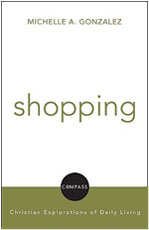Michelle Gonzalez is Assistant Professor of Religious Studies at the University of Miami and the author of three other books. This paperback is part of Fortress Press's new Compass Series: Christian Explorations of Daily Living. David H. Jansen, the series editor, notes in the foreword how essential shopping is to our daily lives and the ways in which it is related to the economy, consumerism, patriotism, advertising, gift-giving, and work performed around the world. He calls for a "reformulation of shopping that more nearly reflects the justice, beauty, and wholeness central to Christian faith."
The rampant consumerism in the U.S. seeps into all aspects of our lives through the products and goods that we purchase, advertising, television, or the leisure time we spend shopping. Many would agree with Simone de Beauvoir who once said that "buying is a profound pleasure." Many Christians might concur, but when goods are valued more than the lives of the workers who create them, then we have a spiritual problem. The culture of consumption has played a part in the destruction of the environment and the U.S.'s gobbling of 25 percent of the world's energy.
Gonzalez provides an overview of the contrast between consumerism values and those of Christianity. She looks at her own tradition of Catholicism and its social teachings on consumerism, the economy, and shopping. She presents the New Testament story of the rich young man; commentary on the Homeboy Industries of Greg Boyle, a Jesuit in Boyle Heights, one of the most violent areas in Los Angeles; and the Prosperity Gospel preached in U.S. mega-churches.
In the closing section of this paperback, Gonzalez takes a middle position between shopping as an idol and shopping as a totally sinful thing to do. The presentation of the material signals that this Compass Series will focus on theology aimed at a highly educated reader, rather than emphasize everyday spirituality for the lay person. That is too bad since the ones most in need of this information are not academics, but ordinary people.
